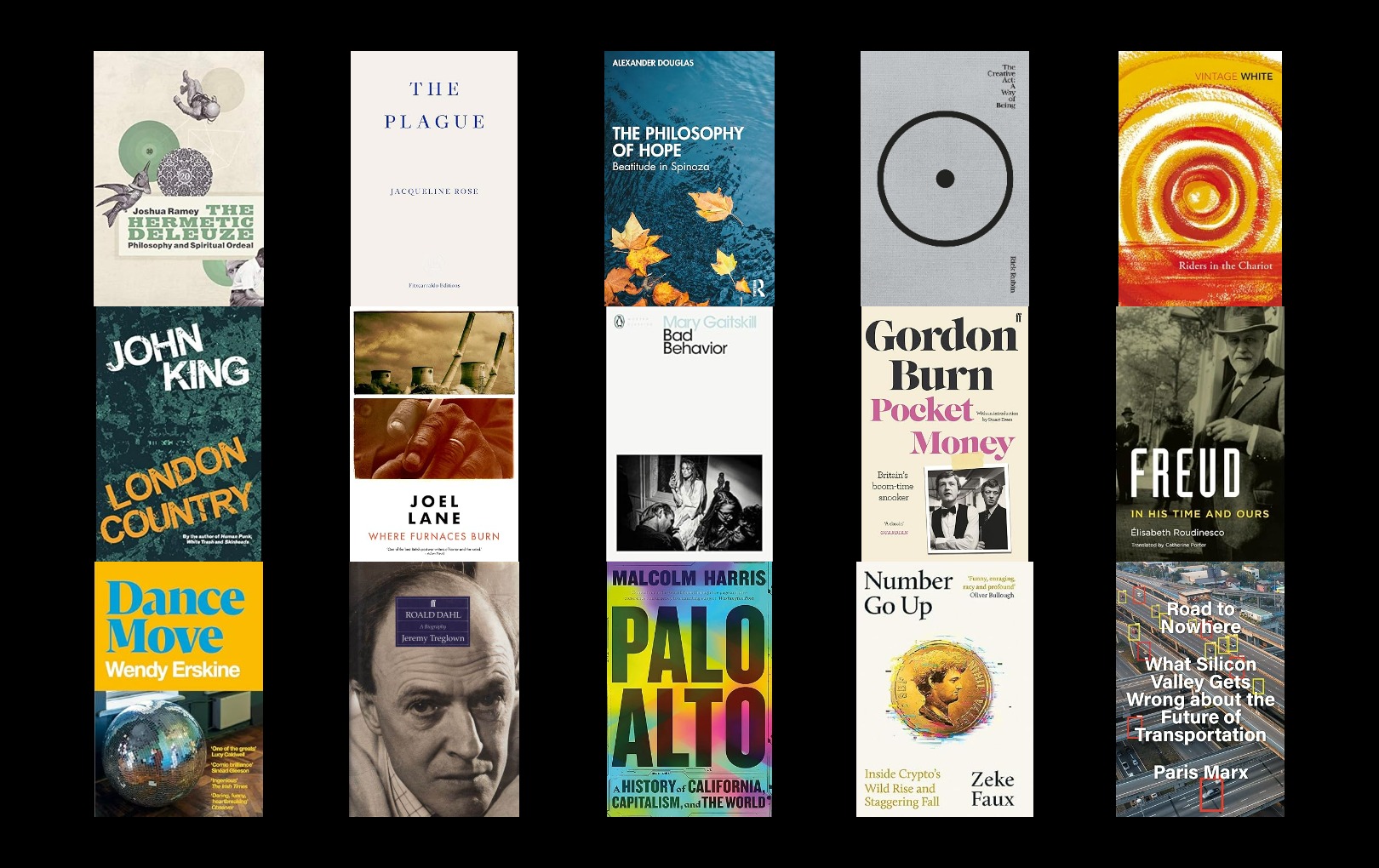
Brad Evans: I Know I Will Never Write a Better Book
If the measure of writing is to get as close as we can to the truth of existence, I know I will never write a
Buffoonery is almost an extended phenotype of dictators, and in times and places in which seriousness, judiciousness, and integrity reign, the buffoon assumes his rightful place near the bottom of the social order, ranting on street corners or sending out misspelled newsletters. It is not the buffoon who should be feared, but the social conditions that permit him to rise above the ridicule that is his natural state. Can one speak of physiognomy here? It doesn’t seem a coincidence to me that Trump, like Franco, like Hitler, is a flaccid, wimpy man with little hands and a grating voice. After Trump’s “grab them by the pussy” moment, the saggy sycophant Nigel Farage, whose constantly gaping mouth recalls one of those plastic coin purses you squeeze to get open, called Trump’s words “typical alpha-male boasting.” Who but goons like Farage or Giuliani could bestow such a title on an erectile-challenged flesh-sack in badly tailored suits whose greatest pleasure is eating Hershey bars in the dark?
It smacks of, but isn’t, hyperbole to say that the popularity of Trump has answered definitively the question of how authoritarianism happens. Strangely, the sight of the real thing renders obsolete the numerous, often ingenious models put forth by thinks as varied as Hannah Arendt and Walter Lacqueur – not because their conclusions are incorrect, but the idea that an explanatory model is needed is fallacious. For much of the population, abjection is inherently pleasurable, and prevarication indistinguishable from truth. The abstention from immediate judgment, the search for right, the broader questions of human destiny that involve the need to understand, listen, compromise, and forgive –– everything, in short, implied in wisdom and conscience –– is an annoyance, and in some way profoundly alien to most people’s natural condition.
This has been on my mind frequently in recent years as I have watched the European and American left stagger from failure to failure. Is it possible that the values of the left simply do not possess the same robust appeal as those of the right, particularly of the extreme right? It has been said many times, with reference to Trump’s unforeseen triumph in the primaries, that the Republican party thought its base cared about fiscal conservatism, low taxes for the wealthy, open markets, and all the rest, when in fact, what drove them all along was racism, xenophobia, and hatred of government. If Klaus Theweleit is right, and fascism must be understood in part as an erotic phenomenon, then the apparent irrationality on the part of the Trump voter in his full-throated advocacy of a farrago of half-baked “positions” that change by the day and range from the impracticable to the impossible must be dismissed as irrelevant: what matters is the feeling of being with Trump, the highly pleasurable relinquishment of intellectual responsibility and the submission to a messianic illusion of a return to “greatness,” the precise definition of which is ever elusive.
In ‘The Stars Down to Earth’, Adorno analyzes the resort to astrology as a response to the generalized inability to comprehend the real economic and political forces determining the conditions of life. Since the time of its writing, the knowledge demands of conscientiousness have grown incalculably while esteem for intellectual and humanistic values has plummeted. As a result, events such as the 2008 economic crash, the Syrian refugee crisis, the rise of Islamic State, or the relation between free trade and prosperity are submitted to the judgment of people ignorant of the criteria distinguishing fact from belief. To proffer a few statistics about Trump supporters:
66% believe Obama is a Muslim, and 61% believe he was born outside the United States.
40% believe Ted Cruz was born in the United States, though it is a matter of public record that Cruz is from Calgary, Alberta, Canada.
54% believe whites suffer more racism than blacks, while only 19% believe that blacks suffer more racism than whites.
This list could be extended ad nauseam. But it is unfair to cast the blame on Trump’s followers alone, as though they were the benighted, Duck Dynasty-watching, Oxycontin chewing underbelly of an otherwise well-informed society. 73% of Americans cannot correctly state the aims of the Cold War; 30% can’t place the Pacific Ocean on a map; 40% believe God created the earth and man fewer than 6,000 years ago; and only around 17% have the necessary literacy skills to correctly read and interpret a bus schedule. The percentage of Americans who report not having read a single book in the past year has quadrupled over the past four decades, and only 28% have read ten or more. One shudders recollecting that Twilight and The Art of the Deal are also books, and may therefore count toward the attainment of this milestone of virtue.
In this situation, the will of the people impends not upon the real contents of political reality, but upon the hyper-simplistic daydreams of the ill- and uninformed, who have made politics into a folk religion whose Bible is filled with stories of September 11, Welfare Queens, Benghazi, and the War Against Christmas.
The idea, if not the reality, has long been that at some point, an educated left would find the Rosetta Stone that would allow it to minister to the masses in a language they could understand, piercing the veil of ignorance and manipulation, exposing false consciousness, bringing together the workers and the intellectuals, etc. But of that small portion of the left not swallowed whole by neoliberalism, the greater part seems to have confused political action with “taking a stand,” particularly on social media platforms that can track these simulacra of rebellion for the sake of better curated “ad content”; and far-reaching concerns about global justice and oppression have crumbled in the face of recondite disquisitions on the arcana of identity politics and thinkpieces about the racism of Vice Principals.
In his diaries, Gombrowicz observes that for all their prattling on about workers, liberals’ true heritage is the nobility, and this is more and more evident to me every time I return to the States. The anger, resentment, hatred, and nihilism that fuel the authoritarian right (a term I use freely because, just today, the hardly un-representative Republican governor of Maine, Paul LePage, has declared, “We need a Donald Trump to show authoritarian power”) have, for many of my left-leaning acquaintances, the inevitability of climatological trends: as they drink craft cocktails or flat whites or stand in line for the best ramen or whatever gastronomical trifle is now the rage, they may hear the murmurs of the barbarians in Slidell, Peachtree City, or Benton, but these people are as strange to them as residents of another planet.
My mother is a nurse who for a time worked in home health care in the marrow of Trump country. Her patients were poor white pillheads who lived off public relief and only left the “holler” once or twice a year. One day, while my mother was changing out a tracheostomy tube or something similarly exquisite, the family matriarch turned to her and said, “Did they ever catch that man what shot Kennedy?” It is not shocking that people like this know nothing about the world –– what use might such knowledge be to them? Whether they descended from farmers, whose livelihood was ravaged by agribusiness, or from steelworkers in the many mills in the nearby city, the last of which closed in the 90s, at some point they were expelled from an economic order that is unlikely to invite them back in. Perhaps the Mexicans, who only appeared in the last twenty years, didn’t “take” their jobs; but the Mexicans have jobs, they don’t, and it would stand to reason that if the Mexicans weren’t there, those jobs could be theirs. It may also be true that “objectively,” black Americans continue to suffer grotesque economic inequality; but access to “objective reality,” which is in fact a kind of consensus, requires a cultural fluency rooted in a system of customs and privileges that millions of people find profoundly alien.
Ignorance in itself is not incompatible with democracy, so long as a society is sufficiently unified as to make common interest a reality. This was possible, perhaps, in America until the interests of capital diverged from those of the nation, and “a rising tide lifts all boats” yielded to the temptations of the virtue of selfishness. Theoretically, a strong left might have opposed these developments, but as Steinbeck remarked, the poor in America have always conceived of themselves as temporarily embarrassed capitalists, and true progressive ideals have never held much sway there. Now, the two halves of the country Lincoln yoked together by force are once more coming asunder, and the Democrats have stuck their heads in the sand while Republicans have fanned the flames. At present, only 29% of Americans believe an armed revolt may be necessary in upcoming years to stave off government tyranny, with another 20% undecided on the matter –– presumably, Trump will draw support from many of these voters, and thankfully, there are not enough of them for him to win. But the mere presence of such a figure on the world stage is terrifying, and there is no sign of political will on either side of the aisle to repair the ideological rifts that made his ascension possible.

If the measure of writing is to get as close as we can to the truth of existence, I know I will never write a

To accompany his latest piece with Tariq Goddard in The Quietus on True Detective Season 4 and the legacy of In The Dust of This Planet, Eugene

As another turbulent year draws to a close, the Repeater team put forward their favourite reads for the festive season. Publisher, Editor, and Author Tariq

If the measure of writing is to get as close as we can to the truth of existence, I know I will never write a

To accompany his latest piece with Tariq Goddard in The Quietus on True Detective Season 4 and the legacy of In The Dust of This Planet, Eugene

As another turbulent year draws to a close, the Repeater team put forward their favourite reads for the festive season. Publisher, Editor, and Author Tariq
